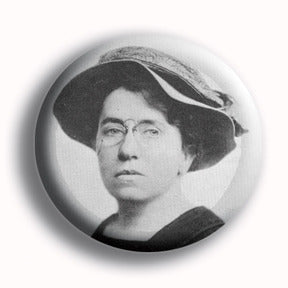Emma Goldman - Revolutionary Woman Button
Part of the "Revolutionary Women Button Series"
This item is available as a 1-1/4" Pinback Button or Fridge Magnet
Emma Goldman, Red Emma, Anarcho - Feminist, Trade Unionist, Activist
Emma Goldman (1869-1940) – Considered the first anarcho-feminist, she is remembered for her activism, writings and the hundreds of lectures she gave. Goldman wrote influential texts on a wide range of subjects including atheism, freedom of speech, capitalism, and marriage to name a few.
Part of the "Revolutionary Women Button Series"
This item is available as a 1-1/4" Pinback Button or Fridge Magnet



Red Emma,top-left, at about 42 years old. Centre: Red Emma as a young woman. Botton-right: Emma Goldman with lifelong partner Alexander Berkman in 1917.
Emma Goldman quotes:
"If voting changed anything it would be illegal."
“Women need not always keep their mouths shut and their wombs open.”
“The most violent element in society is ignorance.”
“No real social change has ever been brought about without a revolution - Revolution is but thought carried into action”
“Poor human nature, what horrible crimes have been committed in thy name!”
“If I can't dance - I don't want to be part of your revolution."
Emma Goldman Biography
Emma Goldman, the daughter of jewish parents, was born in Kovno, Russia on 27th June, 1869. Goldman emigrated to the United States in 1885 and worked in a clothing factory in RochEmma Goldmanester before moving to New York City in 1889.
Influenced by the libertarian writings of Johann Most, Goldman became an anarchist. Working closely with Alexander Berkman, Goldman became active in the trade union movement.
In 1892 Goldman and Berkman started a small business in Worcester, Massachusetts, providing lunches for local workers. Later that year Amalgamated Iron and Steel Workers Union called out its members at the Steel Homestead plant owned by Henry Frick and Andrew Carnegie. Frick took the controversial decision to employ 300 strikebreakers from the Pinkerton Detective Agency. The men were brought in on armed barges down the Monongahela River.
The strikers were waiting for them and a day long battle took place.
Ten men were killed and 60 wounded before the governor obtained order by
placing Homestead under martial law.
Alexander Berkman
was so appalled by Frick's behaviour and decided to make a dramatic
gesture against capitalism. After gaining entry into his office, Berkman
shot Henry Frick
three times and stabbed him twice. However, Frick survived the attack
and made a full-recovery. Found guilty of attempted murder, Berkman was
sent to Western Penitentiary of Pennsylvania in Allegheny City. Goldman was also imprisoned the following year when she was accused of urging the unemployed to steal the food they needed.
After she was released from prison Goldman became involved in the campaign for women's suffrage and birth control information. She was in the news again in 1901 when Leon Czolgosz, who assassinated President William McKinley, claimed he had been influenced by the speeches of Goldman.
After ten years in prison, Alexander Berkman
wrote to Goldman : "My youthful ideal of a free humanity in tile vague
future, has become clarified and crystallized into the living truth of
Anarchy, as the sustaining elemental force of my everyday existence."
Berkman was released in 1906. He wrote that "I feel like one recovering
from a long illness: very weak, but with a touch of joy in life."
Goldman and Berkman edited and published the journal, Mother Earth, between 1906-1917. Goldman also wrote Anarchism and Other Essays (1910) and The Social Significance of the Modern Drama (1914).

After the death of Johann Most, Berkman and Emma Goldman became the leaders of the anarchist movement in the United States. They published the radical journal, Mother Earth and books such as Goldman's Anarchism and Other Essays (1910) and and The Social Significance of the Modern Drama (1914). They also helped organize the Ferrer School in New York City and industrial disputes such as the Lawrence Textile Strike.
On the outbreak of the First World War both Goldman and Alexander Berkman became involved in the campaign to keep the United States out of the conflict. Berkman moved to San Francisco and in January, 1916, started a new anarchist journal, Blast.
When five months later a bomb went off killing six people in the city.
The authorities suspected that the bomb had been planted by anti-war
campaigners and Berkman was arrested but later released. Thomas Mooney, a local trade union leader was falsely convicted of the offence but spent the next twenty-three years in prison before being released.
After the USA declared war on the Central Powers in 1917, it was claimed that Berkman had violated the Espionage Act. Under this act it was an offence to publish material that undermined the war effort. Berkman was arrested, tried and sentenced to two years in Atlanta Federal Prison, seven months of which he spent in solitary confinement for protesting against officers beating fellow prisoners.
People Power People - People who have made a difference. People Power People - People who have made a difference. The heroes and heroines of our time.


Share this item: